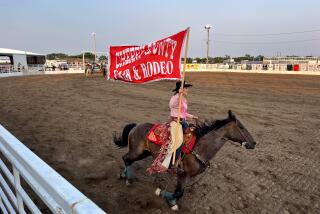Forbes’ Use of Money, TV Barrage Face Test in Iowa
- Share via
DES MOINES — Everyone knows you can’t win a presidential campaign without a heaping dose of money and television. But these days in the Hawkeye State, the question is whether money and television alone can carry the day for the current hot candidate--publishing magnate Steve Forbes.
Forbes’ personal fortune has fueled a relentless electronic advertising blitz that has helped propel his GOP candidacy into second place in the polls, behind Senate Majority Leader Bob Dole.
That ad barrage, in turn, has made Forbes the focus of attention. But whether he can translate his poll numbers into actual votes when Iowans turn out for their party caucuses next month remains far from certain. For this is a contest that traditionally has hinged on intense organizing on the ground rather than effort on the air.
“His TV [campaign] has moved him in the polls; there’s no question about that. Whether it can go further” is open to debate, said Hugh Winebrenner, professor of public administration at Drake University here and an expert on Iowa politics.
Under the state’s caucus system, presidential hopefuls ordinarily need dedicated volunteers to serve as electoral cowboys, who round up supporters and herd them to their caucus sites. Unlike primary elections, voters must commit an entire evening to express their preferences and discuss party issues.
“You’re asking people to spend a couple of hours of their life, on a cold night, in an environment that may not be entirely friendly,” Winebrenner said. “It’s more than going out and pulling a lever.”
One recent statewide poll, for example, showed Forbes and Sen. Phil Gramm (R-Texas) virtually tied for second place among those who said they were “very likely” to attend a caucus. But among those who said they were only “somewhat likely” to go, Forbes held 16% to Gramm’s 6%. In both cases, Dole held the lead with one-third of the vote.
Forbes’ staff is now busy recruiting supporters to walk the precincts and press the flesh to ensure a strong turnout on caucus night. Yet there is no doubt that Forbes’ ground operation pales in comparison to other GOP contenders’, or that the tycoon will continue to ply the airwaves in a campaign befitting a primary contest more than a caucus.
Consider the contrast between Forbes’ campaign and Dole’s, which boasts an organization built over a year of full-time staff effort and a decade of previous bids for the GOP presidential nomination. (He won the caucus in 1988.)
The Dole campaign boasts a leadership bloc in every one of Iowa’s 99 counties. In addition, this week his deputies intend to announce the formation in all 99 counties of farm-oriented leadership groups--a key constituency in a state with $3.2 billion in agricultural exports last year.
Dole’s Iowa campaign manager, Darrell Kearney, said nearly 4,000 precinct volunteers have signed up. “Totally volunteer-driven” phone banks are humming across the state.
“You’ve got to have . . . an organization right down to the grass roots. That’s what we’ve been working at all year,” Kearney said.
In contrast, Forbes, who entered the GOP presidential derby only last September, has just 22 county coordinators, some of whom are salaried and who cover the state’s major population centers, said Chip Carter, director of organization for Forbes in Iowa. The publishing heir has also hired a professional phone bank service, which joins with some volunteers in making 2,000 to 3,000 calls a night.
And Forbes’ personal appearances have stretched not over several years, as in the case of Dole, but over several weeks, mostly with voters in blue suits rather than blue overalls. For exposure in farther-flung parts of the state, he has counted almost exclusively on the cascade of radio and TV ads that have cost him more than $1 million already.
In the Des Moines area alone, Forbes has shelled out $144,000 to WHO-TV, the NBC affiliate--nearly the same amount spent by the next two GOP presidential advertisers combined, said Cheryl Semerad, the station’s director of sales and marketing. The money has given Forbes the opportunity to broadcast several messages simultaneously--in the last few days he has aired four separate ads attacking Dole on different issues in Iowa, New Hampshire and South Carolina.
“It’s the proposition of retail politics as opposed to paid advertising,” said Brian Kennedy, chairman of the state Republican Party. Forbes “hasn’t been able to do that personal sell.”
In Iowa, where caucus-goers expect to be courted and flattered, some voters will therefore complain that Forbes “ ‘hasn’t been in my county.’ It becomes almost an affront,” said Gwen Boeke, the Republican Party national committeewoman from Iowa. Boeke lives in Cresco, a tiny rural town near the Minnesota border, and has yet to hear of any Forbes organization in her area.
Carter, of Forbes’ Iowa campaign, dismisses those warnings, saying the issue is “more a story with you all [in the media] than with the public at large.”
But history is not on Forbes’ side.
“No one has done well in Iowa without significant campaigning here and putting together an organization,” Winebrenner said. “The classic examples of people who tried it were John Connally, Howard Baker [both Republicans] and John Glenn on the Democratic side. They all ran primary kind of campaigns here, without success. They didn’t spend a lot of time on organization, they put in some time here, and they bought media time.”
Still, Winebrenner is chary about making predictions, given Forbes’ success in the polls and his saturation of the airwaves earlier and more completely than any candidate in the past.
“No one has ever done what Forbes has done,” he said.
More to Read
Get the L.A. Times Politics newsletter
Deeply reported insights into legislation, politics and policy from Sacramento, Washington and beyond. In your inbox twice per week.
You may occasionally receive promotional content from the Los Angeles Times.











